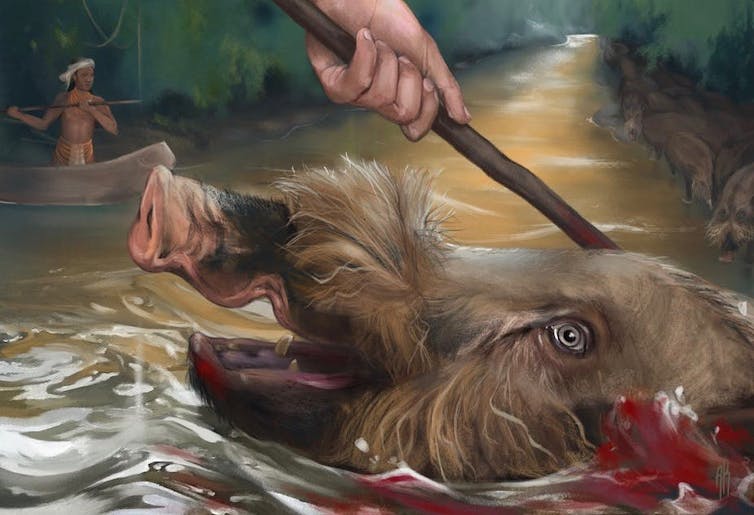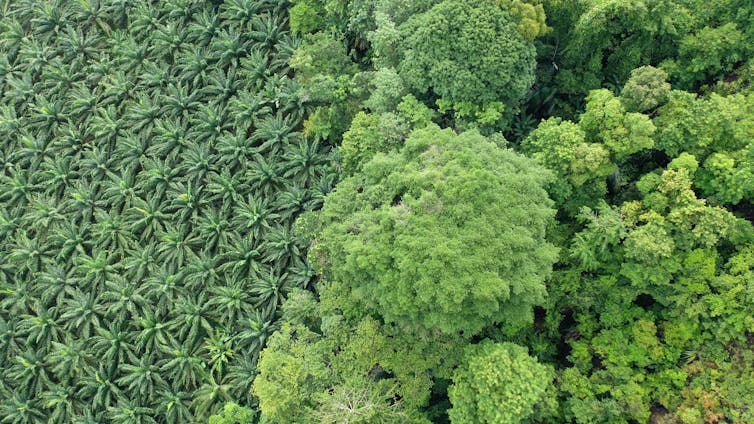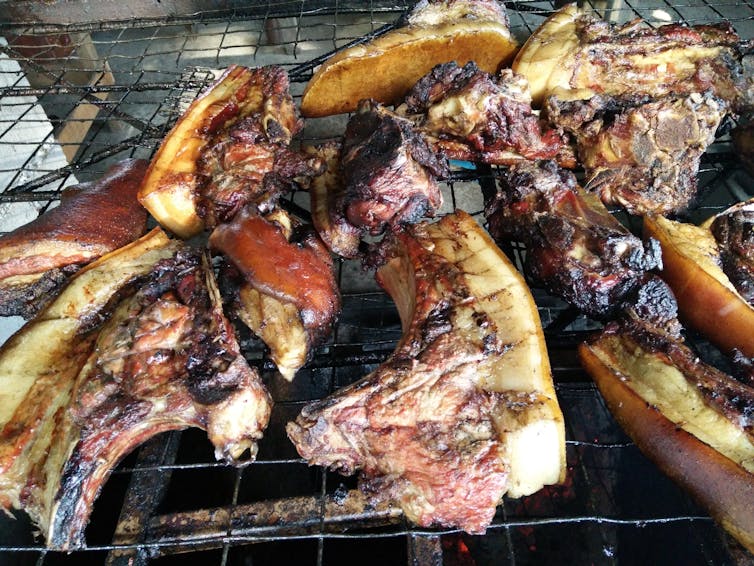how decimation of Borneo's ancient rainforests threatens hunters and the hunted
- Written by Matthew Luskin, Lecturer in Conservation Science, The University of Queensland
For more than 40,000 years, Indigenous communities in Borneo have hunted and eaten bearded pigs – huge, nomadic animals that roam the island in Southeast Asia. These 100kg creatures are central to the livelihood and culture of some Bornean peoples – in fact, some hunters rarely talk of anything else.
But this ancient relationship is now at serious risk. Oil palm expansion and urbanisation are forcing changes to hunting practices in Sabah, a Malaysian state in Borneo. Our research examined these changes by focusing on Indigenous Kadazandusun-Murut hunters, for whom bearded pigs are a favourite game animal.
The oil palm industry has cleared much of Borneo’s lowland tropical rainforests to make way for plantations. And a shift to a more agrarian and urbanised life means many people hunt less than they used to.
Hunting is one of the most fundamental and enduring of human–wildlife relationships. But the changing dynamic between Borneo’s pigs and Indigenous peoples is a powerful reminder of the fragility of these connections. There is much at stake right now, for both the hunted and the hunter.
 Detail from an artistic representation of a traditional form of Indigenous bearded pig hunting.
Amy Koehler/author provided
Detail from an artistic representation of a traditional form of Indigenous bearded pig hunting.
Amy Koehler/author provided
Changing times
As its name suggests, the bearded pig has a prominent beard. It’s a large species thought to move up to 650km in search of food, in large herds of up to 300 individuals.
Wild meat can contribute to as much as 36% of meals in Indigenous Bornean societies, and bearded pig meat accounts for 54–97% of this by weight. Bearded pig hunting is also central to recreation, gift-giving and social practices in many of Borneo’s Indigenous communities.
But widespread deforestation and agricultural expansion (primarily oil palm and rubber plantations) has drastically reduced bearded pig habitat in recent decades. The bearded pig is now listed as vulnerable on the International Union for Conservation of Nature’s Red List.
Sabah has been on the front lines of the oil palm boom since the late 20th century. As of 2015, roughly 24% of Sabah’s land area was covered by oil palm or pulpwood plantations.
Sabahans sometimes take work with oil palm companies, own their own oil palm smallholdings or move to urban areas for relatively well-paying jobs in manufacturing and retail.
Those who remain in rural parts of the state have reduced access to croplands and forests in some areas which, among other negative impacts, restricts their ability to hunt game.
 Oil palm plantations have fundamentally changed Borneo’s landscape.
Shutterstock
Oil palm plantations have fundamentally changed Borneo’s landscape.
Shutterstock
‘This is our life’
We investigated how the above land-use changes have affected pig hunting practices of the Kadazandusun-Murut ethnic group, including 38 interviews with bearded pig hunters.
Hunters are adapting new methods to pursue pigs inside plantations. Respondents reported that hunting in oil palm plantations was easier overall than hunting in forests – because the walking was generally less tiring (and they could sometimes hunt from a car), it was easier to see pigs and foraging locations were more predictable.
Five respondents noted a difference between the taste of meat from pigs in oil palm plantations as compared to forest. One said:
The pig from the forest is much tastier, it’s more fit. If the pig eats oil palm its fat isn’t as sweet.
Many hunters said bearded pigs were “wilder”, “smarter” and more skittish than they had been in the past. Comments included:
The pigs can smell man; they are getting more wild because they are always getting shot by men.
Another participant said:
In the past pigs only looked, but now they run away. Now the pig has got a high school certificate.
Among hunters who had started hunting before 1985, 71% noted this increased flight response, whereas only 26% of those who began hunting after 1985 mentioned this behavioural change.
Respondents consumed wild bearded pig meat more frequently in rural villages than in urban contexts, indicating an important shift in dietary patterns. Some respondents also hunted less frequently when living in urban environments, due to having less time, increased distance to the forest, lower energy because of having to work or other factors.
But despite these substantial changes in hunting practices, much has remained the same over the last few decades. Hunting with guns has remained the primary technique over the past two generations, and meat provision is the primary motivation to hunt.
One respondent said his father taught him:
This is our life. We live in the forest; this is our food.
Cultural practices, such as gifting the meat for community events, provided additional motivations to hunt. Some considered weddings, festivals and church events to be incomplete without bearded pig meat.
 Wild pig meat is an important source of food in Borneo.
Shutterstock
Wild pig meat is an important source of food in Borneo.
Shutterstock
Preserving a fragile relationship
Our results show both the persistence and malleability of hunting practices among Kadazandusun-Murut people in Sabah. The challenge now is how best to manage bearded pig hunting in the face of ongoing oil palm expansion, urbanisation and broader political–economic changes.
The onslaught of African Swine Flu is complicating matters. For the pigs, the deadly virus is an extra burden for a species already in decline. For some Indigenous hunters, it threatens their food security and livelihoods.
The loss of bearded pigs also erodes traditional celebrations and family gatherings, and the passing down of ancient customary hunting practices to children.
Environmental governance initiatives should support the cultural traditions of Borneo’s Indigenous communities, and any new regulation should be devised in collaboration with local people and tailored to their needs. At the same time, these initiatives must ensure the long-term conservation of bearded pig populations and their habitat.
Authors: Matthew Luskin, Lecturer in Conservation Science, The University of Queensland





